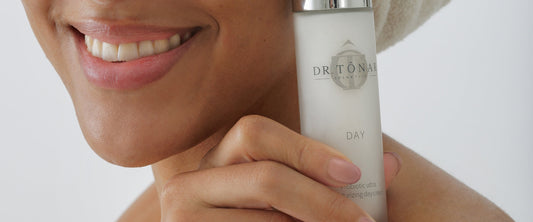The skin needs vitamin D to regenerate, strengthen its natural protective barrier and prevent inflammation. However, our modern lifestyle with long working hours indoors and increased sun protection means that many people are deficient. Read more about the importance of vitamin D for skin health here.
What is vitamin D?
Vitamin D is a fat-soluble vitamin produced by the synthesis of the hormone cholecalciferol in the skin when it is exposed to ultraviolet light. UVB radiation converts cholesterol in the skin into vitamin D. This previtamin D is then transported via the blood to the liver where it is further processed. The vitamin has several crucial functions in the body, the most important being regulating calcium and phosphorus absorption and supporting the normal function of the immune system. Adequate supply of vitamin D is also important for normal growth and development of bones and teeth, and for resistance to certain diseases. Vitamin D can be obtained in a variety of ways, for example from food or from supplements, but the most important source is the body's own production.

How does vitamin D work in the skin?
The sunshine vitamin stimulates cell division and promotes the formation of an intact skin barrier by stimulating the production of important proteins. Promoting new cell formation contributes to a healthier complexion. In addition, the vitamin has a cell-protective effect by promoting the regeneration and repair of skin cells and enabling rapid wound healing. The vitamin also supports the function of immune cells and helps them to recognize and fight harmful pathogens. This makes the skin more resistant to infections and inflammation. Many skin diseases such as eczema and acne are linked to chronic inflammation. Vitamin D inhibits the production of inflammatory messengers and thus reduces redness, swelling and pain. The sunshine vitamin also protects against skin cancer and can help repair UV damage. This may sound paradoxical, but the explanation lies in the dosage. In moderation, sunlight helps to protect the skin from the harmful effects of UV rays and to regenerate it. Excessive sun exposure, on the other hand, damages the DNA in the skin cells.

What happens if you have a vitamin D deficiency?
Vitamin D deficiency is particularly common in countries with temperate climates, as the skin produces less of the vitamin during the long winters. Symptoms in adults range from fatigue, bone pain and muscle weakness to mood swings such as depression. The effects on the skin are also varied. A deficiency slows down cell division and leads to dry and flaky skin. Wound healing is also slower and the risk of inflammation increases. In addition, our largest organ reacts more sensitively to external stimuli, which can manifest itself in redness, itching and swelling. Symptoms can become more severe, particularly in the case of eczema. A chronic deficiency can also increase the risk of developing skin cancer. A blood test at the doctor can determine whether there is a vitamin D deficiency.

How to prevent vitamin D deficiency
Exposing your face, arms, legs or back to sunlight for 10 to 15 minutes two to three times a week is enough to absorb enough of the sunshine vitamin, although some people need more UV exposure (especially in spring and late autumn). Older people, people with darker skin or people living in more northern climates in particular need more sunlight to produce enough vitamin D. Sun protection does not affect vitamin D production. On the contrary: it even protects our largest organ from skin damage. Vitamin D levels can also be increased through diet, as the vitamin is found in some foods, for example fish liver oil, fatty fish such as salmon, mackerel, tuna and sardines, but also in boiled egg yolk, beef liver and foods fortified with vitamin D such as certain breakfast cereals, orange juice, milk or soy drinks. However, the recommended daily dose cannot usually be achieved through diet alone. If there is a deficiency or insufficient exposure to sunlight, vitamin D supplements can be taken. However, this should be done in consultation with the treating physician.

Vitamin D is a real all-rounder for our skin health and our immune system, so it is important to ensure that we have an adequate supply. Even a short walk in the sun helps the body to produce new vitamin D. However, the midday heat should be avoided and appropriate sun protection should not be forgotten, as vitamin D production should not have a negative impact on skin cancer prevention.




